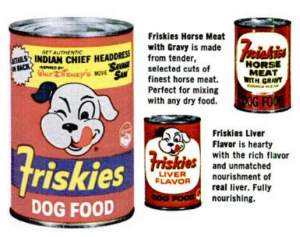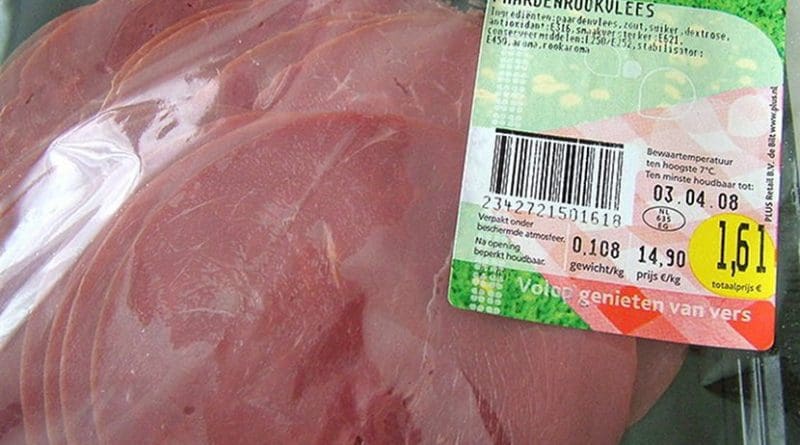Does US Really Need A Federal Ban On Horse Meat? – OpEd
By MISES
By Ryan McMaken*
For decades in the United States, turkey has been the center of the Thanksgiving meal. Some eccentrics may offer other choices, such as roast beef or duck, but nowadays, it’s a sure bet that few households will be offering horse meat as one of Thursday’s featured dishes.
Horse meat has largely disappeared from the Western diet, and not even our pets eat much horse anymore.
In the United States, however, this flight from horse meat has been helped along by the federal government, which, as with so many other matters, has taken up the task of micromanaging how meat is produced in the United States.
In fact, while Congress debates issues like Obamacare and tax reform, it has also been debating whether or not to end a federal ban on horse meat production:
Animal advocates are keeping close watch on Congress amid concern that a moratorium on horse meat production may be in jeopardy.
Congress shut down the industry nearly a decade ago by cutting off funds for USDA meat inspectors. But in July, a key House committee approved an annual farm spending bill that would lift the ban.
The full House then ratified that shift in policy, for the first time in two years — opening the door to revival of an industry that many Americans find repugnant, but which some horse owners view as a practical way to dispose of unwanted livestock.
Horse meat is consumed in a number of countries, including Mexico, Japan, France and Belgium. Two of the three U.S. slaughterhouses serving the export market before the 2006 ban were in North Texas, in Kaufman and Fort Worth.
When confronted by such a story, the first thing one might wonder is “why is this a federal issue?” And then: “where exactly in the Constitution is the part that grants federal power to regulate horse meat.” Hint: it’s not in there.
Obviously, this is the sort of issue that can be handled quite easily at the municipal and county level — if at all — but since the US long ago seized for itself the power to inspect meat, it can just as easily decide what meat can be sold in the marketplace.
A Brief History of Horse Meat
To understand how horse meat came to be something that most Americans couldn’t care less about, we must first take a look at its history.
It appears the last time there was a concerted effort in the West to encourage the consumption of horse meat by humans as high-end cuisine may have been in the late 19th century. According to Frederick Simoons, particularly notable was a French campaign to promote consumption of horse meat, including a posh event at the Grand Hotel in Paris in 1865. At the event, “the horse soup was judged good, and the boiled horsemeat and cabbage was acclaimed excellent.”
Simoons continues:
That same year, a horsemeat butcher shop (boucherie hippophagique or boucherie chevaline) was opened in Paris, and it was soon followed by others…the French campaign stimulated an interest in horse meat in England; a rise in meat prices following an epidemic among cattle enhanced this interest and led to the holding of horsemeat banquets in England in 1868.
In the US, consuming horse has never been terribly popular, largely because other sources of meat have long been so readily available.
On the other hand, horse meat was frequently used in the past as pet food.
 And by “the past” I mean just one generation ago. One need only peruse this June 21, 1963 issue of Life to find an ad for Friskies dog food that announces “Horse Meat with Gravy” dog food, which the ad informs us is made from “selected cuts of finest horse meat.”
And by “the past” I mean just one generation ago. One need only peruse this June 21, 1963 issue of Life to find an ad for Friskies dog food that announces “Horse Meat with Gravy” dog food, which the ad informs us is made from “selected cuts of finest horse meat.”
Many Americans over the age of 50 may remember that butchers often made a selection of horse meat cuts available, usually for use as pet food. Children who are fond of the novels of Beverly Cleary may remember that Henry Huggins’s beloved dog Ribsy was known to eat horse meat.
The prevalence of horse meat in pet food up until the 1960s was even featured in an episode of Mad Men (Season 3: “The Gypsy and the Hobo”) in which a dog-food company sought the help of an advertising firm to help hide from the public the fact its food was made from horses. The episode, which portrayed the public as being horrified by horse meat, is actually anachronistic. Few people in the 60s cared that horse meat was still being fed to dogs.
It is true, though, that by the 1960s, the use of horses for meat was in decline. But much of this was driven by the fact that there were fewer and fewer horses in the United States as the decades rolled by, although a previous glut of horses had made horse meat a staple.
The Rise of Horse Meat as Pet Food
In Catherine C. Grier’s history of Pets in America, she notes that pre-packaged pet foot was itself highly unusual before the 20th century: “Canned dog food first appeared in the 1910s and developed as a regional business with relatively low start-up costs.”
Prior to the 1900s, metal cans were too expensive to be feasible for low-priced animal food, and were only used for higher priced food for human consumption. Thanks to the proliferation of mass production methods and mechanization in the early 20th century, however, canned food became a product that families could afford even for their dogs. Prior to this, people fed their pets scraps, and hardly devoted much of the family budget to specially-prepared meals for cats and dogs.
But mechanization also contributed to the rise of horse meat as an ingredient in pet food, precisely because the horses themselves were being replaced by automobiles and tractors. As Grier notes, “the American public turned from equine- to gasoline- powered vehicles in the 1910s and 1920s.”
In the 1930s, butchers began offering regular delivery of horse meat for dog food along with deliveries for the usual human fare, and “[b]y 1940, canned dog food was a profitable business for regional packers.”
The Stage Is Set for Banning Horse Meat
Back then, of course, few people were interested in banning the slaughter of horses, but even if many had been, they would have met fierce opposition from a great many family businesses and local communities were horsemeat was an important source of income.
By the 1970s, though, federal legislation and regulation was making it increasingly difficult to sell horse for either human or animal consumption. Thus, by 2006, processing horse meat for consumption in the United States had become a thing of the past. Horse meat is still exported, and horse meat in the form of “animal byproducts” still finds its way into pet food. but long gone are the days when Friskies was openly advertising its use of horse meat.
Those who advocate against the federal prohibition on horse meat face an uphill climb. This is made worse by the fact that sentimentalism about horses — even among people who daily eat beef and pork — is very widespread. Moreover, a rapidly rising American living standard throughout the 20th century made horse meat irrelevant to the daily lives of Americans. In parts of the world where meat is especially expensive, horse meat continues to be a viable industry, but in the US, thanks to an abundance of pork and beef, horse meat is a concern only of a tiny minority. And in a democratic system ruled by interest group politics — as is the American political system — the wants of the minority are very frequently disposable.
About the author:
*Ryan McMaken (@ryanmcmaken) is the editor of Mises Wire and The Austrian. Send him your article submissions, but read article guidelines first. Ryan has degrees in economics and political science from the University of Colorado, and was the economist for the Colorado Division of Housing from 2009 to 2014. He is the author of Commie Cowboys: The Bourgeoisie and the Nation-State in the Western Genre.
Source:
This article was published by MISES Institute


I noticed you forgot to mention the Center for Disease Control stopped horsemeat when hysteria and anthrax became an issue in the 1950’s. You failed to mention All the drugs, vaccines, and medications prescribed that are Banned by the Food and Drug Administration that are Not able to enter the food chain. You don’t mention the 1981 Lawsuit where the Federal Government Banned Horsemeat in pet food and Chicken feeds after it killed thousands of animals and poultry. THE pet food nan continues and as it’s unlawfully found lawsuits for dead pets are ongoing. THE FACT IS. ….no one eats horsemeat, it’s not raised as a food source ani.al and you leave out all the Violence neglect and outright abuse the animals endure to get to the plant. THEY are Not a food animal. THE American public as well as other countries including France don’t consume it…..in fact they have proven it’s hidden in foods and not really purchased knowingly. Horses are brutalized look at Colts Western Shop Facebook page to learn more. Your encouraging something that only a mere handful of people want for deceptive reasons and greed. We have closed the Plant in Dekalb, Illinois because of all these reasons. Federal judges had to literally lock the Plant because they ordered closed and still ran a shift, so they are criminal as well. Most people working in the Industry are violent felons, proven, environmentally is unhealthy for air and contaminates soil and underground water. It’s vile and they have proven constantly forged health certificates and last. Canada started with 5 plants and they now have 2 left. It’s closing because there’s no demand. It’s a last ditch effort to reopen in the USA to hide in other meats and Our need producers can’t afford it to happen, it destroys consumer confidence when it’s hidden in beef. I know first hand the damage a plant causes to a state. I know first hand the Violence abuse and neglect it causes. Abusers dump horses I to the food chain to anonymously avoid animal abuse charges. THE FACT IS no one wants it. Even Mexico and Canada are starting to Ban it. Face it, it’s got to end. Call Congress and tell them No slaughter in The USA.
Read up on the plant in Kaufman, Tx, Dallas Crown, and what it did to that town that got it shut down. It was a very long and expensive battle, and the plant got away with nearly a million dollars in unpaid fines for polluting water, air and a neighborhood behind the plant. It was also a waste of taxpayer dollars, brutal to horses. Horsemeat only gets produced as an illegal substitute for beef. Also — it’s full of drugs banned in livestock raised for food, which horses aren’t. They are about the most medicated animals on the planet, mostly with drugs that no food animal is allowed to ingest.
Read “Texas Mayor Paula Bacon Kicks Some Tail” in Forbes, and read some of the other articles by that author.
Anthelmics in horse wormers also proved fatal to certain breeds of dogs. So no dog food possibilities.
If you really want to eat horse meat, do it in a country whose horses aren’t required to be vaccinated, wormed, and given painkillers.